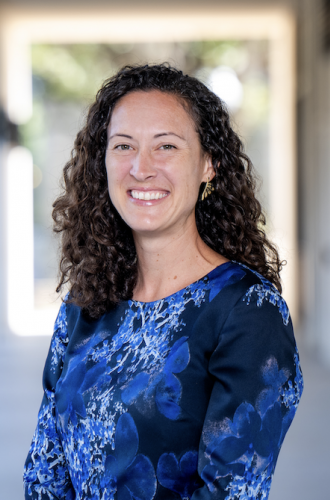-

-

-
-
Dr. Natalie Poulos received her PhD in Health Behavior, MS in Health Education, and MS in Nutrition from The University of Texas at Austin. She also completed a postdoctoral fellowship in early family health with The University of Texas at Tyler, Health Science Center and The University of Texas Systems Administration, Office of Population Health. She is also a Registered Dietitian. Her research broadly focuses on food security and community health by using communited engaged research methods.
-
Dr. Poulos' research focuses on food insecurity, family centered care, and community nutrition using communited engaged reserach and qualitative methods.
-
Select Publications
-
Ruggles PR, Thomas JE, Poulos NS, Pasch KE. (in press). Oversaturated: Association between School-Level Economic Disadvantage and Exposure to Unhealthy Food and Beverage Advertisements around Schools. International Journal of Environmental Research and Public Health.
-
Poulos NS, Nehme E, Mandell DJ. (2023) Qualitative Research to Describe Food Bank-Healthcare Partnerships: What types of models are currently being used to facilitate food bank-healthcare partnerships? Journal of the Academy of Nutrition and Dietetics.
-
Buettner SA, Pasch KE, Poulos NS. (2023). Factors Associated with Food Delivery App use Among Young Adults. Journal of Community Health. DOI: https://doi.org/10.1007/s10900-023-01229-1
-
Poulos NS, Nehme E, O’Neil M, Mandell DJ. (2021). Implementing Food Bank and Health Care Partnerships: Perspectives from Charitable Food Systems. BMC Public Health. DOI: https://doi.org/10.1186/s12889-021-12031-w
-
Poulos NS, Henson-García M, Bouchacourt L, Mackert M, Mandell DJ. (2021). Fatherhood During COVID-19: Perspectives from Fathers on Pregnancy and Prenatal Care. Journal of Men’s Health. DOI: http://doi.org/31083/jomh.2021.119
-
Poulos NS, Pasch KE. (2021). Associations of school-level weight status and healthful and youth-oriented restaurant features found within the food environment of youth. Childhood Obesity. DOI: https://doi.org/10.1089/chi.2021.0151
-
-
Select Presentations
1. Poulos NS* (March 2022). Working Together to Support Relational Health in Families: Optimizing and Supporting Food Bank-Healthcare Partnerships in Texas. Curated and presented during an expert panel for the Pediatric Brain Health Summit 2022. Recorded session can be found here: https://www.txsafebabies.org/2022summit/
2. Poulos NS* (December 2021). Food Bank and Healthcare Partnership Findings Across Texas: Preliminary Findings. Presented at the Food Bank-Healthcare Partnership Leader Convening. Recorded sessions can be found here: https://www.youtube.com/watch?v=wXEGzzlF--U&t=936s & https://www.youtube.com/watch?v=c15DUTNTGeM
3. Poulos NS* (December 2021). Food Bank-Healthcare Partnership Models: Voices from Texas Food Banks and Healthcare Partners. Moderated at the Food Bank-Healthcare Partnership Leader Convening. Recorded sessions can be found here: https://www.youtube.com/watch?v=c15DUTNTGeM
4. Poulos NS*, Buek KW, O’Neil MM, Mandell DJ (October 2021). Fatherhood during COVID-19: Perspectives from fathers and post-partum nurses on perinatal care. Paper presentation at the annual conference for the American Public Health Association in Denver, CO.
5. Poulos NS*, Nehme E, O’Neil MM, Mandell DJ (June 2021). Food Bank and Health Care Partnerships: A cross-sector approach to supporting families experiencing food insecurity. Paper presentation at the annual meeting for the International Society for Behavioral Nutrition and Physical Activity (virtual).
-
NTR 390.14: Theories of Nutrition Behavior
NTR 315: Nutrition Through the Lifecycle
NTR 316: Food and Culture
-







